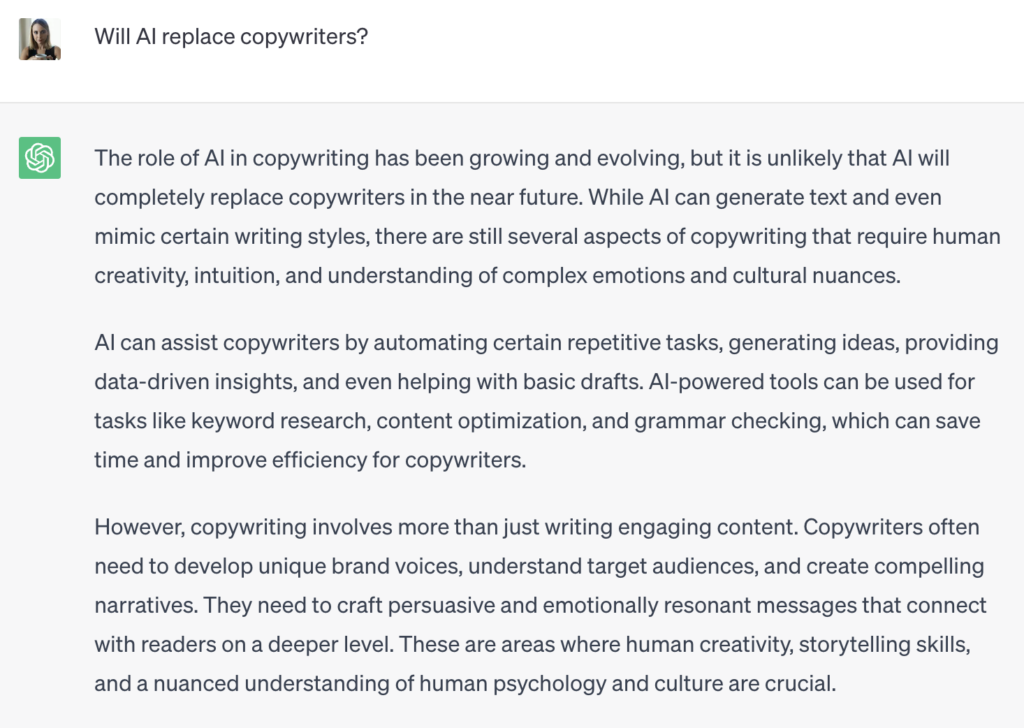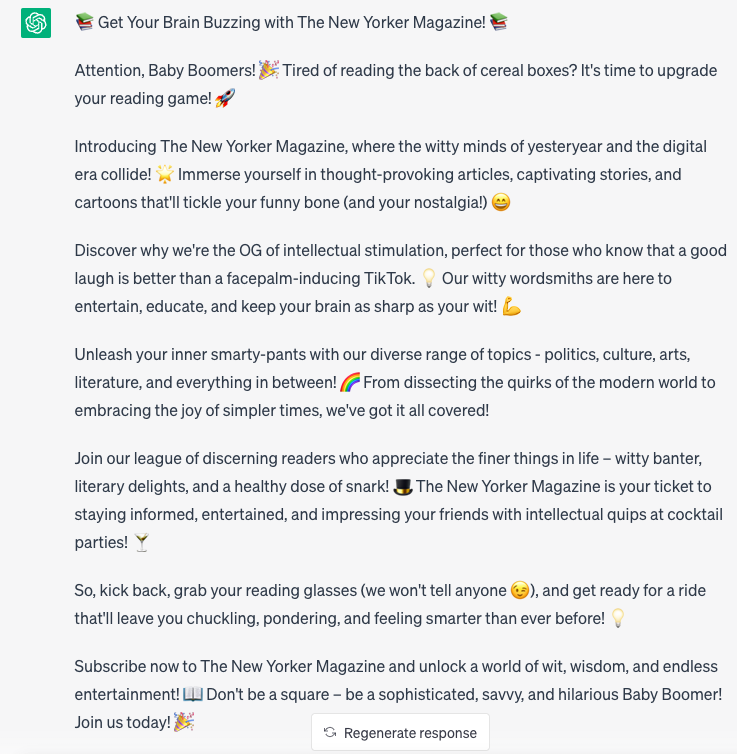
It’s a question almost every new copywriter has: “Is AI (artificial intelligence) taking over copywriting?” How can you not be asking this when every other headline is:
“AI is coming for your job next” 😟
“AI is wiping these people out of work” 😰
“Within 5 years, AI will destroy these careers” 😱
People loooooove to click on sensationalist, put-a-stake-in-the-ground headlines.
And the algorithm just feeds the drama.
No one is clicking on headlines like “AI is changing the way these 5 job roles go about their work.”
But here’s the boring truth: AI is a support, not a solution.
And those headlines are based on feeling not fact.
Nonetheless, it’s a valid concern. With new AI models like ChatGPT and Jasper.ai combined with sensationalist news headlines like “AI means the end of the world,” it can get anyone’s heart racing. And, if you’re getting into a new career, you want to know there’s going to be work and job growth potential.
Here’s a side note on that from CareerExplorer.com:

No career field looks like it did 10 years ago—or even 5 years ago. Instagram, TikTok, heck—the Internet itself!!—are so new in the scheme of advertising and copywriting.
People have had to evolve from expensive photoshoots to more quick-and-dirty content to meet the cadence of the social media cycle.
Copywriting has been around for decades (Google it, and some people would argue *centuries*). Copywriting is not going away, just evolving like everything else.
But the “is AI taking over copywriting” question is one I’ve been excited to address since I saw this headline in a business email: “JPMorgan Chase Partners with an Ad-Writing Machine…Literally.”
The crux of the story is that they’ve signed a five-year deal with a start-up called Persado that uses AI to write creative ad copy.
SCREEEEEEECH. I sense copywriters everywhere stopping in their tracks and clutching at their hearts.
And here’s an example of human versus robot writing:
Human version: “Access cash from the equity in your home”
AI version: “It’s true—You can unlock cash from the equity in your home”
And, yeah, the AI version doesn’t sound stilted or odd the way that previous AI copywriting programs generally have.
But…AI will not replace copywriters in our lifetimes. Here’s why.
AI Copywriting Is Only As Good As What Humans Feed It
Fundamentally, any company that wants to use AI to write their copy has the same problem that people have whenever they try to replace a creative human with a machine.
First of all, in order to program the software to write copy, they need tons and tons of creative humans to input possible options. Artificial intelligence doesn’t just happen. It has to be taught, and that takes a lot of time and effort and expense to even get to the place where software sounds remotely like a human.
And it can’t come up with ideas on the fly when someone needs a quick change. It needs to be programmed to fulfill any job. For the vast majority of companies, in almost every scenario, it’s just going to be faster, easier, and more effective to hire a skilled human to do it.
The Weaknesses of Artificial Intelligence and ChatGPT
There are many flaws in AI and programs like ChatGPT. Perhaps Courtney Herda from SiteCare put it best:
“The results of our experiment found the greatest weaknesses in AI-generated content: a proclivity for outdated information, poor use of citations, an overreliance on surface-level overviews, and a lack of cohesion between concepts. These weaknesses are further reinforced by the disparity in initial results in the SERP rankings. Quality and performance from content written by humans and for humans performed better, likely not just because it was written by a human, but because the topic was analyzed critically.”
Courtney Herda from “The Article AI Didn’t Write: Taking On ChatGPT One Word at a Time“
In fact, SiteCare did an experiment with AI-generated content and found that human-created content outperformed all AI-generated content. Readers stayed on the page longer with human-generated content. Human-created content also had a lower bounce rate, meaning users were more likely to click to other pages on the site before leaving the site. Google’s algorithm also ranked the human-created content higher.
Copywriters Are Creative in Ways AI Isn’t
Even when it gets good, though, AI can’t be creative. It can’t come up with possibilities that make sense that no one’s ever heard before. It just can’t. By its very nature, it’s going to be derivative.
AI also can’t connect with human beings in the ways that copywriters can. It’s not pitching prospective clients ideas. It can’t listen to a client’s pain points and challenges and then come up with effective solutions. And it doesn’t have the emotional intelligence to write copy that connects at the deepest level with the target audience.
Plus, it can’t write to a tone of voice. A major part of what copywriters are trained to do is take a brand voice and write copy in that voice. Skilled copywriters have the ability to make their copy feel like it’s part of the brand and relate to its customers.
Again, AI is only as good as what you feed it.
So, for example, if you ask “will AI replace copywriters?”, this is the answer it provides:

Notice how it has a lot of the points we’re making in this article. That’s because ChatGPT is spitting out what it is finding across the web on this topic. (Good news: there seems to be a consensus!)
But the writing demonstrates a key point: It’s pretty stilted.
AI Copywriting Tools Aren’t Capable of Matching Brand Voice
Your job as a copywriter is to make sure your client doesn’t sound like anyone else. To do that, you need to create copy that doesn’t exist yet. AI copywriting tools use what already exists to write copy, so they can’t come up with something original and they can’t write to a voice.
Here’s what happened when we asked ChatGPT to write a banner ad for the New Yorker magazine using humor that Baby Boomers would understand:

The excessive emoji use and terms like “OG” are certainly not aimed at a Baby Boomer. Is it humorous? Not really. Would this copy fit on a banner ad? No way! (Of course, the input could be revised to say write an ad in six words or something more specific.)
AI Is Used for Content More Than Copywriting
Content writing and copywriting are two different things. Content writing requires a lower level of skill, so it makes sense that AI is being used to write content.
AI can churn out blog posts on topics that don’t require original thought, expertise, or research. Essentially, it can take information that already exists and regurgitate it.
What it’s not going to do is brainstorm strategy or write an original piece of content based on an expert’s unique perspective or experience.
AI Will Replace Writers…Just the Unskilled Ones
And, of course, too, don’t forget that there are millions of companies in this world of all shapes and sizes, and the vast majority of them don’t have the funds or the need to purchase an AI copywriting program—especially one that can’t fulfill all of the functions that a human copywriter could.
I’m sure that companies will still try to come up with programs that replace copywriters, just as they keep trying to come up with programs that replace all other kinds of human functions because that’s what tech companies like to do.
And they will replace some writers—really crummy writers who haven’t received training and who don’t know how to write copy that’s in line with a brand and its audience. Writers who think strategically, concept ideas, and connect with their audiences on an emotional level are valued and will remain valuable to businesses.
Your job as a copywriter involves so much more than writing. Just as one example, a client may come to you and say, “I want to create an Instagram ad driving to this $5,000 product!”
As a copywriter, you have the understanding that driving cold traffic to a $5,000 product isn’t going to work. Perhaps what they need is actually an email nurture series that allows prospective customers to see the value in the $5,000 product so they’re more likely to purchase.
How You May Use AI Tools to Help Your Process
You may use AI copywriting tools to help your writing process! It may help you come up with SEO-optimized headlines, for example. Or, it may help you expedite mundane tasks like transcribing interviews. Or maybe you’ll use it to overcome writer’s block by having it generate some ideas to get you going.
But is AI taking over copywriting? No.
Adaptability will always be crucial in any field. But lucky for us, the core principles of copywriting (features vs benefits, a clear CTA, etc.) remain the same.
These programs simply won’t have the flexibility, the scope, or the creativity to replace copywriters completely. I’m sure some companies will test them out and some will try to use them, but the vast, vast, vast majority of companies will still get more benefits out of using human copywriters—and that will still likely include the companies who are using the software, too.
Watch More: Why AI Isn’t a Worry
Hear Nicki and Kate discuss on episode 96 of the Build Your Copywriting Business podcast why artificial intelligence is not something copywriters need to worry about—now or in their lifetimes.
Using AI to Your Advantage to Wow Clients and Land High-Paying Work
While AI isn’t taking copywriting jobs, it’s also not going away. That means, you need to use this tool to your advantage.
While AI is replacing people who don’t know how to write copy in the first place, it’s also making the best copywriters even better. Make sure you’re one of them by listening to this workshop. You’ll get ideas for ways you can incorporate AI into your day-to-day workflow, pllus prompts that will help you get a better output.
Psst: Want to be an irreplaceable copywriter? Get training from 20+ year copywriting and marketing industry veterans >>
Your Turn
What has been your experience as a copywriter with AI? Are you afraid it will replace you? Why or why not? Let us know in the comments below!
Last Updated on June 4, 2025
This reminds me of the vast resources (software, programming etc) it takes to make an artificial human hand even move its fingers. It will be some time yet before AI replaces the elasticity of the human brain which has been hundreds of thousands of years in the making.
Hi Mike,
I completely agree. 🙂
Thanks for commenting!
Nicki
Great article Nicki. But I think you’re underestimating the extent to which AI will revolutionize this field in a decade.
“I’m sure some companies will test them out and some will try to use them, but the vast, vast, vast majority of companies will still get more benefits out of using human copywriters—and that will still likely include the companies who are using the software, too.”
Just like it seemed impossible that everyone could carry a mini-computer around with them everywhere with access to tons of information with a few key strokes (i.e. smartphones) through the lenses of the 20th century, it’s not far-fetched to predict that forms of AI will become available to smaller companies with time.
Although copywriting will never fully “go away,” as in there will always be marketing strategists to come up with the “big ideas” and how to execute a layered campaign, I can definitely see copywriting as a “career” first being augmented by AI, then eventually phased out with the advance of technology.
Just thought I’d offer an alternative viewpoint.
Hi Itzcha,
I’m going to have to continue to disagree with you. Computers will certainly replace many things and many jobs, and while AI can run numerous permutation of word combinations, it hasn’t mastered creativity. Copywriting is a combination of creativity and strategy that delves into emotion and intention and AI isn’t capable of doing that. There’s a reason that no one is concerned about AI replacing authors or painters or entrepreneurs—it’s not capable of the original though that all of those pursuits (and copywriting) require.
Thanks for commenting!
Nicki
Niki, as I’m sure you’re reading, ChatGPT is definitely replacing some copywriters. I just saw another column about it today.
Perhaps these weren’t the best writers, or their employers didn’t value good writing, but there’s a small percentage whose clients have decided a ChatGPT article is “good enough for SEO.”
Platforms like Fivver have acknowledged that much of their business — optimized articles written for fractions of a penny per word — is at risk.
I don’t cry over the loss of content mills, but I do believe jobs are being lost.
Hi Mike, Yep – I bet you’re talking about the Washington Post OpEd. Just about every copywriter I know had that forwarded to them by relatives! The important thing to note is that though those writers called themselves copywriters, they’re actually content writers. AI absolutely has and will continue to replace content writers (not that that’s a good thing, but it’s a reality). Copywriters, though, provide a very different type of writing and a different level of strategy and partnership with their clients. We dig in a bit more in podcast episode linked above if you’re interested. Thanks for commenting!
I recently learned how to create custom GPTs tailored for specific tasks with specific voices. If you train the GPT on sufficient information and prompt it correctly, it can create content that sounds 90% human in the correct brand voice that requires minimal editing. You can even use other GPTs to refine things to sound more human if you want.
This is indeed more effective for content than for sales copy. But you can train the bot to give you a fantastic starting point for anything if you know how to do it,
Either way, the most important point in this article is that people want to work with people. It’s just faster, easier, and more effective, and even some tech companies are so used to working with people that they’re not switching everything to LLMs anytime soon.
Bottom line – writers of all kinds should learn how to effectively use AI to enhance their processes. It can be a great time saver – after you put in the time to teach yourself how to use and prompt AI, creating your own custom bots where necessary. And that’s not to mention Grammarly’s new generative AI features.
Thanks for sharing this, Brian! AI can be a great resource to expedite and assist in the copywriting process (e.g., brainstorming and research), and it behooves every copywriter to at least learn the basics. But, like you said, AI simply cannot replace the human touch component and all that comes with it. 🙂